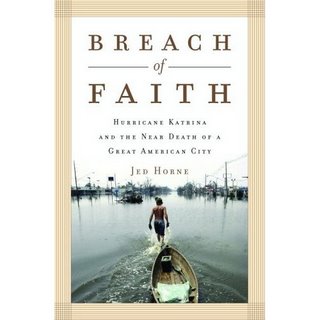This past summer I attended the American Libraries Association’s conference in New Orleans. We were the first international conference to meet in the city after Katrina. One could tell, too. The citizens were thrilled to see 17,000 extra people mulling through their shops and streets. They treated us as royalty. They were grateful we chose to visit them and spend much needed money. Not necessarily a huge amount, we are librarians after all.
One of the meetings I attended was titled “Southern Voices.” It was an opportunity for southern authors to discuss their latest books. The panel and their books included: Mark Childress and his new release One Mississippi, Tom Piazza’s Why New Orleans Matters, and Jed Horne’s Breach of Faith: Hurricane Katrina and the Near Death of a Great American City.
They were all engaging, with distinctly different voices and writing styles. One may know Mr. Childress from his book-made-into-movie, Crazy in Alabama. He read an excerpt that had us all in stitches. Mr. Piazza discussed the unique culture of New Orleans by framing the people who call it home.
The room became silent as Jed Horne took the podium. Mr. Horne’s introduction included an awe-inspiring Pulitzer Prize Award for his recent work at New Orleans Times-Picayune newspaper during Katrina. The two authors, prior to his presentation, were as rapt as the audience awaiting his speech. Mr. Horne explained that while reporting in the field he was repeatedly stopped and told harrowing stories—stories that needed to be told, but just too abundant for the newspaper’s space. He took names and numbers and when the city became relatively normal he pursued the storytellers.
Mr. Horne explained that while reporting in the field he was repeatedly stopped and told harrowing stories—stories that needed to be told, but just too abundant for the newspaper’s space. He took names and numbers and when the city became relatively normal he pursued the storytellers.
What I truly like about the book is Horne’s ability to let his subjects tell-all. He doesn’t hold back their political views and theories, which creates a sense of frustration for the reader—the same frustration one may have felt while sitting in a cozy home and watching the events unfold through the television.
Another asset Horne brings to the book is a clear understanding of local politics. As metro editor his job is to know the city’s political history. His style will thrill the reader, as he starts a story, and then slows in the middle to explain perspectives. One eagerly reads the vignettes as cliff hangers.
My Mission...Not Impossible...Make Mississippi Read!
Wednesday, August 30, 2006
Breach of Faith (copy)
Subscribe to:
Post Comments (Atom)



No comments:
Post a Comment